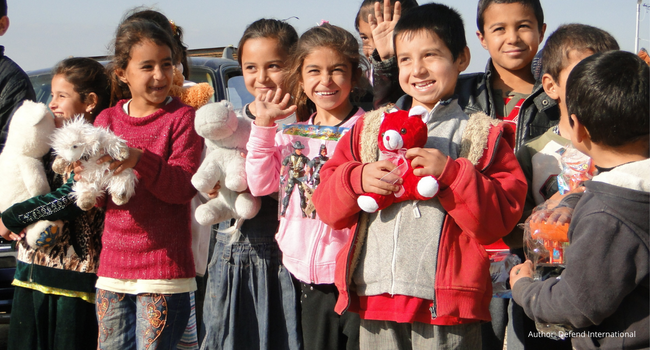


The Yezidi nation of Ezidikhan, in collaboration with 90 indigenous nations globally and talks with states, has since 2018 been laying the foundation for a permanent Nations’ International Criminal Tribunal (NICT) with the planned expectation that the Tribunal may be established in Yezidi territory inside Armenia as early as 2023. The NICT will hold accountable individuals, states, militias, and other entities that joined the 2014 Islamic State of the Levant (ISIS) in the forced occupation and mass killings of Yezidi people.
Ezidikhan Prime Minister Barjis Soso Khalaf has stated, “The Nations’ International Criminal Tribunal is being established to hold accountable those who murdered and enslaved our people. It will serve as an international court to hold responsible perpetrators of crimes committed against Ezidikhan and other indigenous nations for prosecution and legal judgment.”
The United Nations approved the Convention on the Prevention and Punishment of the Crime of Genocide—an important state-based international law ratified in 1951—that makes it a crime to commit acts intended to destroy a people in whole or in part obligates ratifying states to pursue enforcement and prohibition. By 2022, 152 of the world’s 206 internationally recognized states will have ratified the Convention.
Despite the Convention on Genocide adopted by state governments, no legal or political action was ever taken against alleged perpetrators of crimes until 1993. In 1993 the United Nations-sponsored the International Criminal Tribunal for former Yugoslavia, the International Criminal Tribunal for Rwanda, and the Khmer Rouge Tribunal (in Cambodia) for the 1975 – 1979 mass killings of 2 million people) in 2009.
The International Criminal Court, established in 2002, has indicted fifty individuals for the crime of genocide. Of these, 21 include continuing and unresolved cases, 14 individuals are at large as fugitives, five are individuals on trial, and one is appealing sentence. Of the fifty individuals, 29 cases have been completed resulting in one person serving a sentence, seven individuals have completed their sentence, and seven died before the trial was completed. The vast number of these cases involve alleged crimes committed inside Africa.
Acknowledging the disappointing record of the Convention on Genocide, Ezidikhan Justice Minister Nallein Sowilo remarked, “A mere fifty individuals being held accountable for the millions of indigenous people killed, forced from their ancestral territories due to colonization, rape, torture, and suffering from destroyed lands and resources caused by states and corporations is ridiculous. The fact that states are neither preventing or punishing crimes of genocide dictates the need for a Ezidikhan-sponsored Nations International Criminal Tribunal.”
According to the Center for World Indigenous Studies, since 1945 there have been more than 181 additional alleged crimes against humanity and genocide. These alleged crimes have been committed against the Yezidi in Iraq, Kurds in Iraq, and Iran; the Chakma and Mio in Bangladesh; the Krah, Gio, and Mano peoples in Liberia; and among many other indigenous nations since the adoption of the Convention. More than 12 million indigenous people have been killed up to 2022. Additional unresolved crimes committed before 1945 include:
“Humanity demands a fierce commitment to holding responsible states, corporations, individuals, and even those indigenous nations that commit crimes against other indigenous nations. The time has come, and we will take the necessary steps to hold perpetrators accountable”, states Justice Minister Sowilo.
The library is dedicated to the memory of Secwepemc Chief George Manuel (1921-1989), to the nations of the Fourth World and to the elders and generations to come.
access here